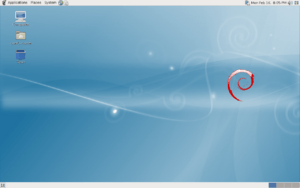Free software facts for kids

Free software is a type of computer program that gives you lots of freedom! It means anyone can use it, share it with others, and even change it. You can do this whenever you want and for any reason. When we say "free," we mean "free as in freedom," not "free of charge." The opposite of free software is called proprietary software, which has many rules about how you can use it.
The idea of free software began in 1984. A computer expert named Richard Stallman started the free software movement when he began the GNU Project. Some well-known examples of free software include Linux (which is a core part of many operating systems), Blender (for 3D graphics), OpenBSD, and Inkscape (for drawing). Even Wikipedia uses free software to run!
Contents
Free Software vs. Open Source
Free software and open source software are very similar. However, they have some important differences in their main ideas.
People who support "free software" believe that computers should be used in a way that helps people. They think everyone should have four basic rights when it comes to computer programs:
- You should be able to use programs on your computer however you want.
- You should be able to learn how the programs on your computer work.
- You should be able to change programs to make them better for you.
- You should be able to share programs you have with other people.
The free software movement also believes that all software should be free (as in freedom). They think that even a small program that isn't free could be risky. For example, it might secretly watch what you do on your computer.
People who prefer the term "open source" also like these rules. However, they are not as strict. They don't always say that every program must be open source. They often focus on how these rules can help companies and businesses create better software.
How Free Software Works
If a person creates a computer program and wants it to be free software, they must let others use it. This means people can use it for almost anything (as long as it's legal). They can also study it, change it, and share it without limits. The creator does this by using a special agreement called a free license.
The creator of free software cannot stop others from selling their program. They also cannot stop people from using their program for things they might not like. This isn't because the creator supports bad things. Instead, they believe that limiting a user's rights can be risky for the users themselves.
Free Software vs. Freeware
The word "free" in "free software" means freedom, not price. This can be confusing! People are allowed to sell free software. But the person who buys it can still change it, give it away, or sell it to someone else.
Sometimes, people use "free software" to mean programs that you can download without paying money. This is often called freeware. Freeware usually lets you make copies for others. However, it often does not let you do all the things you can do with real free software. For example, you might not be able to change it or sell it. Freeware is almost always proprietary software, meaning it has many restrictions.
Related pages
Images for kids
-
Linux Mint is an example of a free-software operating system. It shows programs like the Firefox web browser, the Vim text editor, the GIMP image editor, and the VLC media player.
-
Richard Stallman, who started the Free Software Movement (2002).
-
Even though most computer viruses affect Microsoft Windows, antivirus software like ClamTk (shown here) is available for Linux. It helps users find harmful programs that might infect Windows computers.
-
LibreOffice is a free office program that works on many different types of computers.
See also
 In Spanish: Software libre para niños
In Spanish: Software libre para niños
 | Victor J. Glover |
 | Yvonne Cagle |
 | Jeanette Epps |
 | Bernard A. Harris Jr. |





